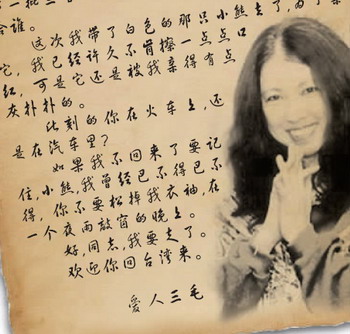In memory of an olive tree

San Mao, who influenced countless readers with her unconventional lifestyle and delicate literary works, passed away on January 4, 1991. This month, her best friend, Sui Haoping, came to Beijing to commemorate the twentieth anniversary of her death and launch his new book San Mao’s Last Letter.
San Mao, whose original name was Chen Maoping, was born in Chongqing on March 26, 1943. In 1948 she left mainland for Taiwan with her family.
She adopted the pen name "San Mao" when she published her novel Chinese Hotel in 1974 – taking the name from a character in the first book she ever read – An Orphan on the Streets by the famous Chinese cartoonist Zhang Leping. "When I came across San Mao, the orphan wandering in the streets, I realized there were a lot of poor children struggling to survive. When I began to write, I decided to faithfully record the lives of ordinary people whose voices go unheard. So I chose this name," San Mao wrote in her foreword to the Taiwan edition of Zhang’s comic book.
Search for an olive tree
As a child, San Mao was very sensitive to people and her surroundings. But she held fast to her principles and values. According to her elder sister, Chen Tianxin, San Mao rebelled against the beatings administered by her teachers. "Corporal punishment was common in Taiwan at that time. Ordinary students like me would accept it. But she refused to compromise. She would ask: ’Why am I being punished if I did nothing wrong?’ Later she quit school despite our parents’ objections," Chen said.
San Mao was essentially self-taught from the age of 12. She read all the great works she could lay her hands on, and published her first essay in 1962, when she was 19. She then began a life as a globe-trotting writer. She left her footprints in Spain, Germany and the U.S., and married a Spanish man, Jose Maria Quero Y Ruiz, in a ceremony held in the Sahara Desert. As her famous poem The Olive Tree says: "Don't ask me where I come from. My hometown is far away. I wander and search for the olive tree in my dreams." San Mao led a vagrant life.
Her descriptions of her experiences and feelings on the road changed the attitudes of a generation. "San Mao’s independent works and personality have influenced readers, especially women, for the past 30 years. Her brave and legendary life opened people’s eyes. Her wisdom and passion are still remembered," veteran publisher Shi Yonggang said.
But tragedy soon struck. After her husband died in a diving accident in 1979, her health deteriorated rapidly. She returned to Taipei in 1986, and in 1989 she wrote the screenplay for the movie Red Dust, which went on to win 8 Golden Horse awards. But her health never recovered, and shortly after being hospitalized in 1991 she was found dead in a hospital bathroom with silk stockings around her neck. She left no last words and the exact cause of her death remains a mystery.
Boundless love
San Mao’s death had a profound effect on her friends and fans. Sui Haoping, who had been one of Taiwan’s most famous TV anchors, immediately quit his job and spent the next 20 years fulfilling San Mao’s dream of traveling around the world. Sui has traveled to 170 countries and written hundreds of articles to commemorate his friend. "San Mao once said she wished to visit the cannibal tribes in New Guinea and the Amazon. All the time I was on the road, I felt like I was following in her footsteps," he said.
To commemorate the twentieth anniversary of his friend’s death, Sui created 20 paintings, and wrote 20 stories and 20 songs about her life. He collaborated with the Yangtze River Art and Literature Publishing House to launch "A Letter to San Mao," asking fans to write their messages on postcards to be stored in San Mao’s memorial hall in Taiwan.
Shi Yonggang’s recently completed biography of San Mao was also published on January 4. The book includes many previously unpublished paintings and photographs by San Mao. "San Mao was more than just a writer. Her free gypsy lifestyle is the dream of most human beings. Isn’t her freedom something we all desire?" Taiwan writer Nan Fangshuo wrote in the foreword.
 0
0 







Go to Forum >>0 Comments